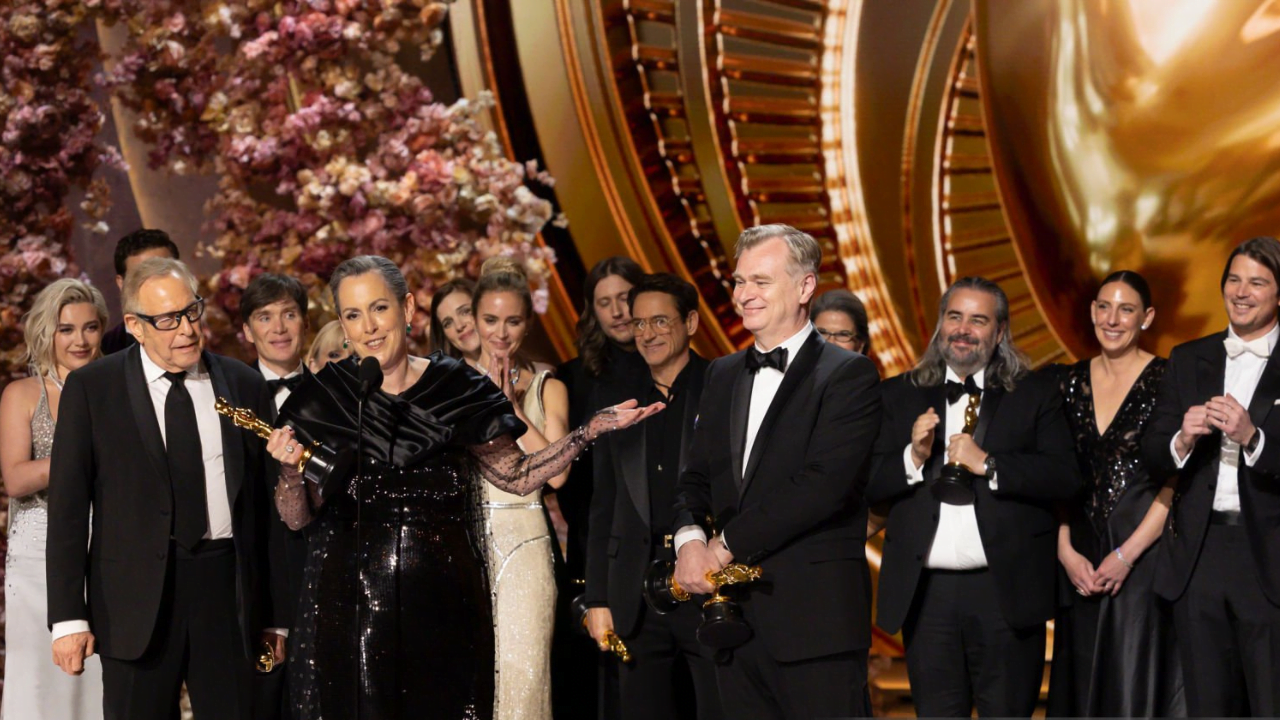The 96th Academy Awards marked the end of a unique awards season, characterized by the first simultaneous strikes of actors and writers in Hollywood history that largely prevented campaigning by talent for months. As expected, Oppenheimer emerged as the big winner, clinching seven Oscars – the most since Slumdog Millionaire won eight awards 15 years ago. The movie won major categories including best picture (awarded to Christopher Nolan, Emma Thomas, and Chuck Roven), director (won by Nolan), actor (Cillian Murphy, who became the first Irish winner in the category), supporting actor (Robert Downey Jr.), cinematography (Hoyte van Hoytema), film editing (Jennifer Lame), and original score (Lugwig Göransson).
The filmmakers behind the movie “Oppy” have achieved a remarkable feat, adapting a supposedly unadaptable book into an instant classic film. Based on Kai Bird and Martin J. Sherwin’s American Prometheus: The Triumph and Tragedy of J. Robert Oppenheimer, the movie has not only impressed audiences but also the Academy.
Donna Langley, the chairperson of Universal Studios, convinced Christopher Nolan to leave his long-time home at Warner Bros. and offered him $100 million to create an epic movie that focuses less on explosions and more on brilliant conversations in small rooms. This was not an easy sell, but the steady hands of Chief Marketing Officer Michael Moses and Director of National Publicity Jen Chamberlain helped turn the movie into a blockbuster hit.
Tony Angellotti, an experienced awards strategist from The Angellotti Co., deserves credit for guiding Universal’s awards campaigns since 1999’s “Man on the Moon.” He has now led the studio to win Best Picture awards in three different decades, with “A Beautiful Mind” in 2001, “Green Book” in 2018, and now “Oppy.” He was supported by his excellent team, including VP Dana Bseiso Vazquez.
The Oppy campaign began with a clear goal of getting Nolan the recognition he deserved. The resulting film was both timely and urgent, even after 80 years, thanks in part to current global events. It drew audiences back to theaters, and was carefully managed to make Nolan seem more relatable, keep Downey on message, and highlight Murphy’s talent. Meanwhile, Greta Gerwig’s Barbie film won only one Oscar for Best Original Song, despite its success at the box office. The Academy tends to prefer serious films like Oppy to satirical ones like Barbie, but the latter’s success was still impressive.
At the awards ceremony, Yorgos Lanthimos’ movie, Poor Things, won four awards, including best costume design, production design, makeup/hairstyling, and lead actress. Emma Stone won the award for lead actress, beating Lily Gladstone, who was poised to become the first Indigenous American winner. A high-level awards strategist praised Searchlight’s impressive creative advertising campaign that helped Poor Things to punch above its weight.
Anatomy of a Fall, which won the Palme d’Or at the Cannes Film Festival, claimed two awards for best original screenplay and best international feature, making it the first U.K. entry to win the award. The Zone of Interest, which won the Grand Prix at Cannes, won best sound. The streamers, on the other hand, collectively prevailed in just two of the 23 categories. Netflix, which landed 19 nominations across 11 films, won only one award for best live-action short for Wes Anderson’s The Wonderful Story of Henry Sugar.
Netflix devoted a lot of resources to its 2023 awards slate, especially for Maestro, but it was polarizing and faced a weird online-driven backlash against Bradley Cooper. The company has racked up 150 nominations, including nine for best picture, and 23 wins, but it is clear that this year was an aberration.
Amazon won one award at the event, with Cord Jefferson’s American Fiction winning the best adapted screenplay category, beating Oppenheimer, Barbie, The Zone of Interest and Poor Things. Meanwhile, Apple’s Martin Scorsese-directed movie Killers, which had a budget of $200 million, went 0-for-10, just like Scorsese’s 2019 film The Irishman and 2002 film Gangs of New York. Only 1977’s The Turning Point and 1985’s The Color Purple had a worse 0-for, losing all 11 of their noms. Despite Leonardo DiCaprio’s efforts to promote the film, people found it hard to sit through a three-hour, 26-minute movie, especially when watched at home on a TV.
A publicist not involved with Killers recently opined that Apple’s Oscars campaign for the film was excessive and potentially a turn-off for voters. However, Apple’s ability to spend big money may give them an advantage in attracting top filmmakers to their platform.
It’s interesting to consider if Emily Gladstone would have won an Oscar if she had campaigned for best supporting actress instead of best actress. It’s impossible to know for sure, but we do know that Da’Vine Joy Randolph and Oppy’s Downey both won their respective categories and received positive reception from voters across all important awards shows.
The recent 96th Oscars showed that the Academy has become more international than ever before. Four years after Parasite made history as the first non-English-language best picture winner, members from 93 countries voted to select this year’s nominees, and the best picture category featured an unprecedented three nominees that are mostly or entirely not in English (Anatomy, Zone and Past Lives). Additionally, this year’s list of winners included more films that are largely or entirely not in English than any previous Oscars ceremony. There were six such films in total: the French-language Anatomy (for original screenplay), the German-language Zone (for international feature and sound), the Ukrainian-language documentary about war, 20 Days in Mariupol (for documentary feature), and two Japanese-language films from Toho International, the low-budget monster movie Godzilla Minus One (for visual effects) and Hayao Miyazaki’s possible final work, The Boy and the Heron (for animated feature).



